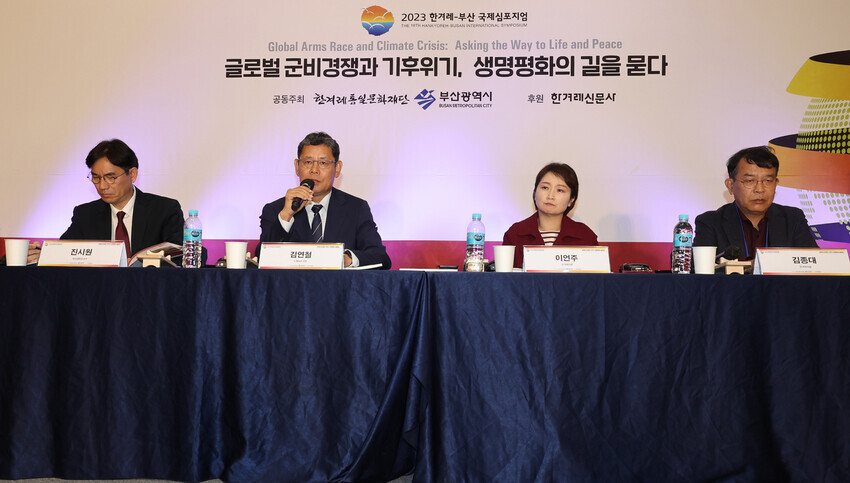hankyoreh
Links to other country sites 다른 나라 사이트 링크
Experts voice concern about Seoul’s foreign policy being subordinated to alliance with US, Japan under Yoon

A discussion about the direction of South Korea’s foreign policy at the 19th Hankyoreh-Busan International Symposium, held on Wednesday at the Nurimaru APEC House in Busan’s Haeundae District, unleashed a flood of concern and criticism about South Korean President Yoon Suk-yeol’s foreign policy ideology and orientation. The discussants’ concerns ran the gamut from the Yoon administration’s strategy for responding to changes in the world order and its North Korea policy to its undemocratic rejection of public opinion.
“While the essential goal of foreign policy is to expand the nation’s scope of activity, the Yoon administration’s foreign policy is only serving to shrink that,” remarked Kim Jong-dae, former lawmaker with the Justice Party.
Kim Jong-dae criticized Yoon for limiting Korea’s options by narrowing its diplomatic stage from the Asia-Pacific to the Indo-Pacific and by subordinating the economy to national security, in a rejection of the principle of keeping the economy separate from politics. Even though Korea is a “maritime-continental” country, at the junction of the Asian continent and the Pacific Ocean, Yoon has followed the lead of the US and Japan in adopting a maritime strategy, creating a gap between Korea’s “survival space” and “survival strategy.”
Lee Un-ju, a former lawmaker for the People Power Party, also called out Yoon’s unbalanced approach to foreign policy.
“Korea is a country that has depended and will continue to depend upon exports, on going to other places to sell our products. But since Yoon became president, we’ve been completely subordinated to a trilateral alliance with the US and Japan that’s based on the US’ global strategy of containing China,” Lee remarked.
“Rather than being forced to choose between the US and China, Korea ought to adopt a pragmatic foreign policy of maximizing strategic autonomy. As a mid-sized developed country, Korea needs to work on strategic autonomy through cooperation and solidarity with countries in a similar position such as France, Germany and Canada, as well as Southeast Asian countries like Vietnam,” the former lawmaker added.
“We need to take note that a considerable number of countries, including India, Turkey and Saudi Arabia, have adopted ‘tightrope’ diplomacy between the US and China in response to the Russia-Ukraine War, which broke out amid the US and China’s strategic competition,” noted Kim Yeon-chul, a former minister of unification.
The discussants shared their concern about the “ideological bias” of the Yoon administration’s foreign policy.
“Foreign policy needs to be employed flexibly and prudently while prioritizing the national interest, but the Yoon administration’s foreign policy is not only ideologically rigid but also feels too rushed. Many countries use ideology in their foreign policy as a means of achieving their interests, but they don’t employ an ideological foreign policy that abandons those interests,” said Kim Yeon-chul.
“The Yoon administration makes a lot of pointlessly hostile remarks. How does constantly picking fights with the other side serve national security? It’s irresponsible to endanger the state and people to gain an edge in domestic politics,” said Lee Un-ju, the former PPP lawmaker.
“The Yoon administration’s foreign policy is seriously divorced from public opinion. He’s acting like an old feudal king barking out orders,” Lee said, citing the example of the government’s ambiguous attitude toward the discharge of contaminated water from the Fukushima nuclear power plant, which has aroused widespread concern and opposition from the public.
Kim Yeon-chul responded by offering the following suggestion.
“While more than 30 years have passed since democratization in 1987, the government departments in charge of foreign policy and national security still aren’t under democratic controls. We need to enact institutional changes to effect those controls, such as ensuring that civilians serve as defense ministers,” Kim said.
By Lee Je-hun, senior staff writer
Please direct questions or comments to [english@hani.co.kr]

Editorial・opinion
![[Editorial] Intensifying US-China rivalry means Seoul must address uncertainty with Beijing sooner than later [Editorial] Intensifying US-China rivalry means Seoul must address uncertainty with Beijing sooner than later](https://flexible.img.hani.co.kr/flexible/normal/500/300/imgdb/original/2024/0517/8117159322045222.jpg) [Editorial] Intensifying US-China rivalry means Seoul must address uncertainty with Beijing sooner than later
[Editorial] Intensifying US-China rivalry means Seoul must address uncertainty with Beijing sooner than later![[Column] When ‘fairness’ means hate and violence [Column] When ‘fairness’ means hate and violence](https://flexible.img.hani.co.kr/flexible/normal/500/300/imgdb/original/2024/0516/7417158465908824.jpg) [Column] When ‘fairness’ means hate and violence
[Column] When ‘fairness’ means hate and violence- [Editorial] Yoon must stop abusing authority to shield himself from investigation
- [Column] US troop withdrawal from Korea could be the Acheson Line all over
- [Column] How to win back readers who’ve turned to YouTube for news
- [Column] Welcome to the president’s pity party
- [Editorial] Korea must respond firmly to Japan’s attempt to usurp Line
- [Editorial] Transfers of prosecutors investigating Korea’s first lady send chilling message
- [Column] Will Seoul’s ties with Moscow really recover on their own?
- [Column] Samsung’s ‘lost decade’ and Lee Jae-yong’s mismatched chopsticks
Most viewed articles
- 1[Editorial] Transfers of prosecutors investigating Korea’s first lady send chilling message
- 2For new generation of Chinese artists, discontent is disobedience
- 3[Photo] 1,200 prospective teachers call death of teacher “social manslaughter”
- 4[Exclusive] Unearthed memo suggests Gwangju Uprising missing may have been cremated
- 5[Column] Samsung’s ‘lost decade’ and Lee Jae-yong’s mismatched chopsticks
- 6[Column] When ‘fairness’ means hate and violence
- 7Xi, Putin ‘oppose acts of military intimidation’ against N. Korea by US in joint statement
- 8S. Korea “monitoring developments” after report of secret Chinese police station in Seoul
- 9[Special reportage- part I] Elderly prostitution at Jongmyo Park
- 10[News analysis] Samsung in management crisis due to owner risk